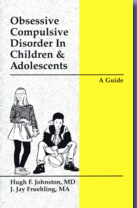
| Table of Contents | |
| Excerpt 1 | |
| Excerpt 2 | |
| Testimonials | |
| Authors Hugh F. Johnston, MD and J. Jay Fruehling, MA |
Obsessive Compulsive Disorder In Children & Adolescents: A Guide(Excerpt 1) OCD can make day-to-day life very difficult for children and adolescents. They may worry that they are "crazy" because they are aware that their thinking is different from their friends and family. Life is often experienced as stressful because OCD symptoms can consume a great deal of time and energy, making it difficult to complete tasks such as homework or household chores. Children with OCD may have low self-esteem because their inability to control their OCD symptoms has often led to embarrassment and frustration. Mornings can be especially difficult for children with OCD. Many of these children feel they must do their rituals exactly right or things will not go well during the rest of the day. Yet, at the same time they are trying to very carefully do their rituals, they are feeling rushed to be on time for school. This combination leads to feeling pressured, stressed, and irritable. Bedtime can also be particularly difficult. Children with OCD may feel they must finish all of their compulsive rituals before they can go to sleep. Yet, they also need to get their homework finished and take care of their other chores and responsibilities. Some children stay up late into the night and are exhausted the following day. Children with OCD sometimes do no feel well physically. This may be due to the general stress of having the disorder, or it may be related to loss of sleep or poor nutrition. Obsessions and compulsions connected to food are common and can lead to sporadic or eccentric eating habits. Because of these, and perhaps other unknown factors, many children with OCD often have many physical complaints such as headache or upset stomach. Children with OCD usually have periods of time in which they are extremely angry at their parent(s). Sometimes this is because parents have become unwilling (or are unable) to comply with the child�s "unreasonable" demands. For example, children may insist that their clothes be washed multiple times or that they be allowed to shower for hours on end. When parents set limits, the child typically becomes very anxious and angry. This intense anger often seems "out of character" for the child, leaving the parents confused. Sometimes parents will give in to these "temper tantrums," but later will feel powerless and manipulated by their child. It is common for parents to differ between themselves on how these "temper tantrums" should be handled, and this can lead to dissension and inconsistent parenting. Peer relationships may also be stressful for children with OCD because they often try very hard to conceal their rituals from schoolmates and teachers. When OCD is severe, this becomes impossible, and the child may be teased and ridiculed. Even when OCD is not severe, it may interfere with making friends, because so much time is spent preoccupied with obsessions and compulsions, or because friends react in a negative way to unusual OCD-related behaviors.
|